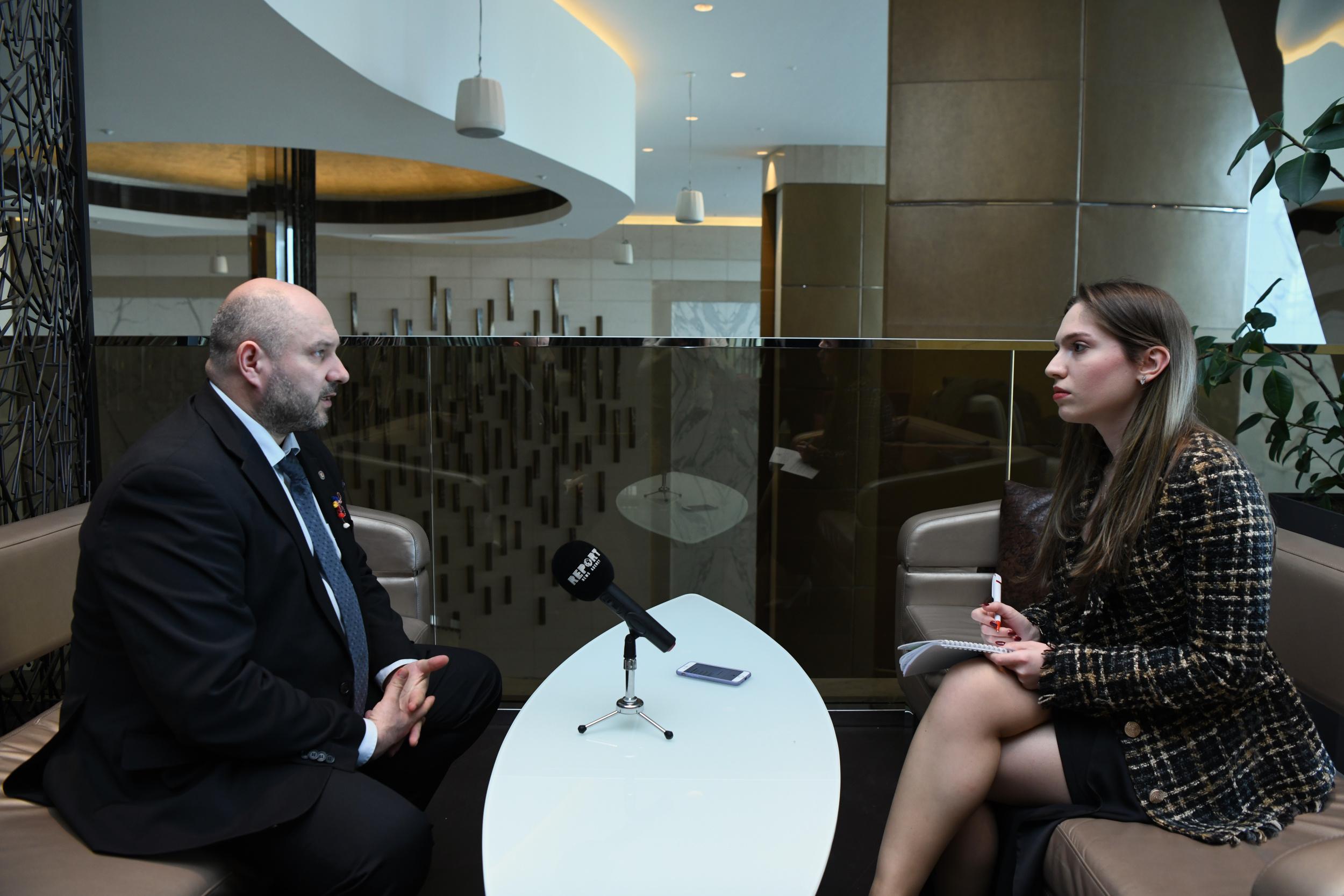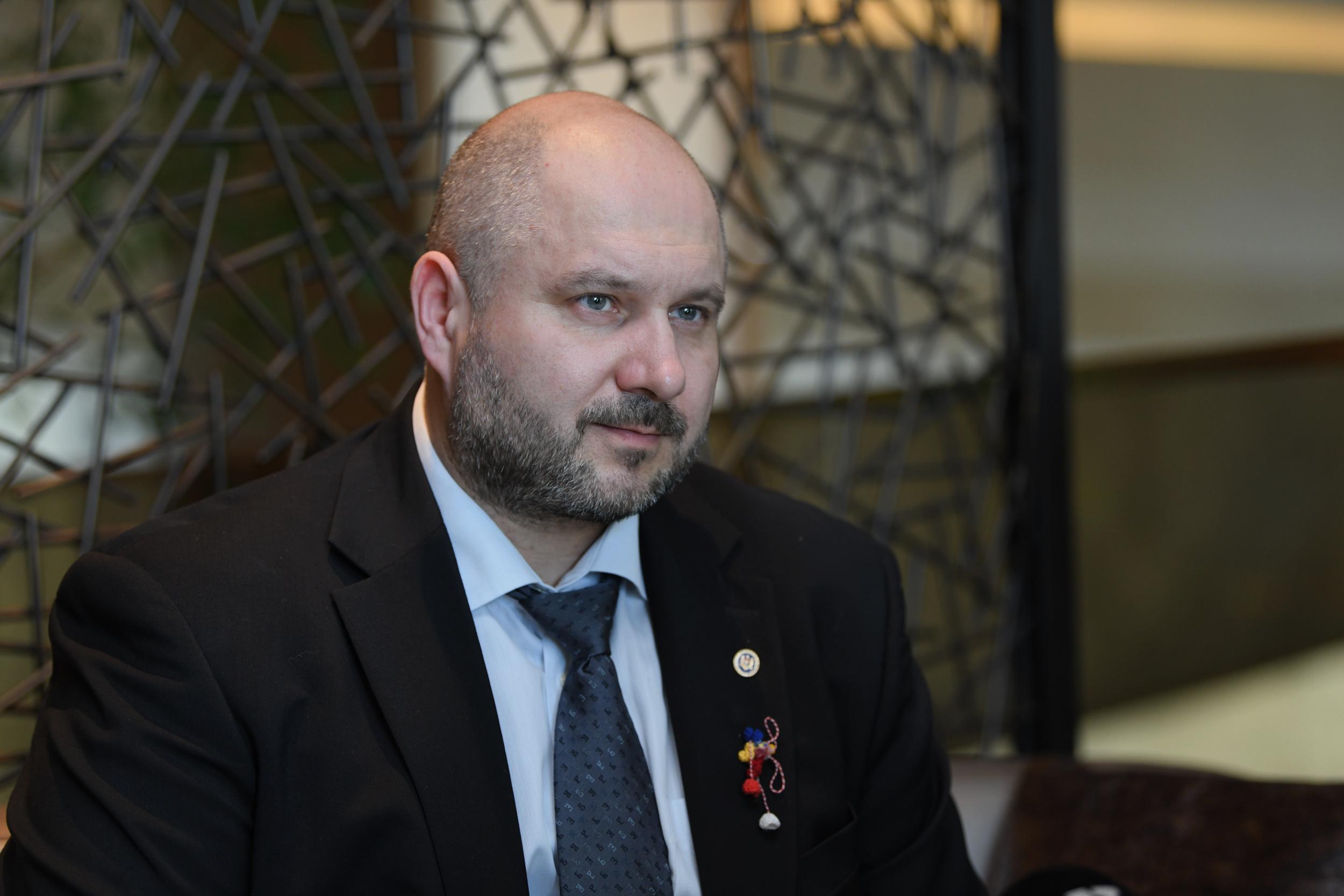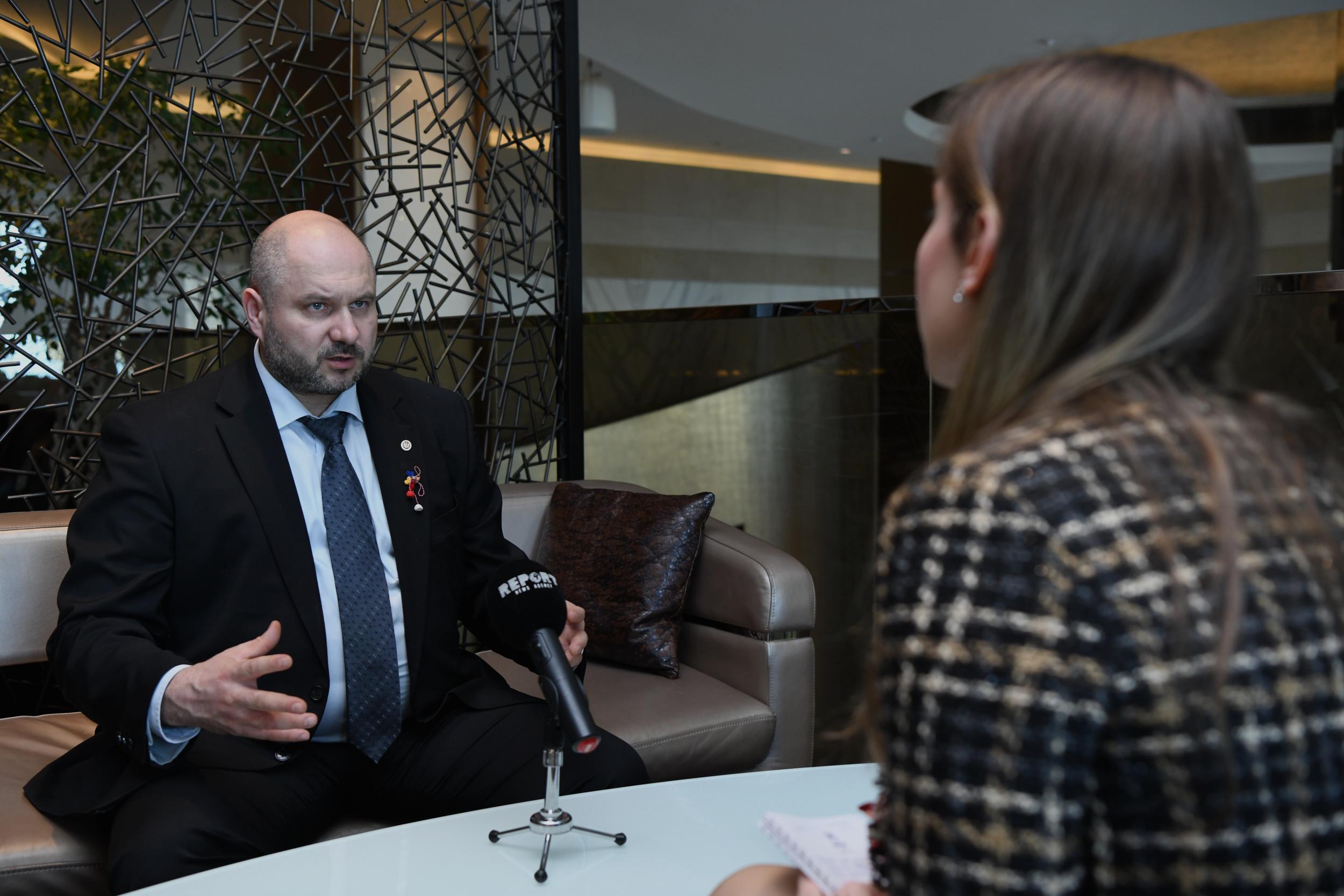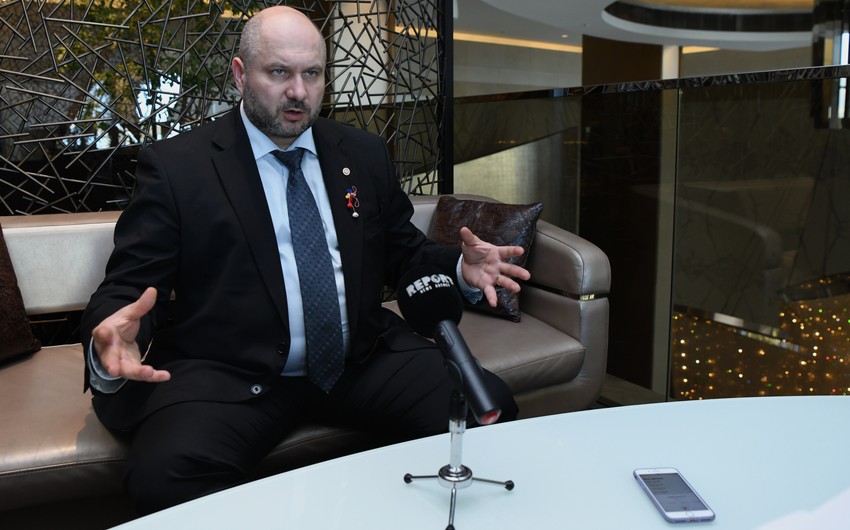On March 1, the 10th Southern Gas Corridor Advisory Council Ministerial Meeting and 2nd Green Energy Advisory Council Ministerial Meeting was held in Baku. One of the key issues discussed in the capital of Azerbaijan was increasing supplies of natural gas from the Caspian region to Europe.
Azerbaijan is actively expanding the geography of natural gas supplies to the European continent. So far, gas is supplied to eight countries, six of which are in Europe. There may be more such recipients in the future.
Among the participants in the meeting of the advisory council was Minister of Energy of Moldova, Victor Parlicov. In an interview with Report, he shared his thoughts about the SGC, the role of Azerbaijan in ensuring gas supplies to Europe, spoke about reforms in the energy market of Moldova, possible cooperation with Baku within an undersea cable project for transmitting electricity across the Black Sea, etc.
-How do you comment on the outcomes of the recent 10th Southern Gas Corridor Advisory Council Ministerial Meeting and 2nd Green Energy Advisory Council Ministerial Meeting in Baku?
-Well, first of all, at the first anniversary of this meeting, I mentioned during my opening speech that it all started with a vision. And the vision was actually coming from Baku on developing or strengthening this southern corridor for bringing Caspian gas into Europe. And ten years ago, few people believed that such magnitude of projects would be feasible and make sense.
But particularly after the invasion of Russia in Ukraine and the change of the whole geopolitics around the energy, the southern corridor played an important role and Azerbaijan played an important role in securing gas supplies and security of gas supplies in Europe. But it is also moment of celebration for the success of the project that proved to be successful and useful after a major change, let’s say, due to the war in Ukraine.
-What is your perspective on the increased capacity of the Southern Gas Corridor and the significance of the Solidarity Ring project?
-Now it is also a moment to think forward, to think ahead. It’s also a moment to think beyond what the southern corridor is today, because the Caspian region does not finish in Azerbaijan, there are potential producers of gas and producers of renewable energy and hydrogen across the Caspian Sea. So we should probably think beyond about extending the Caspian corridor, both the southern corridor, in terms of bringing more capacity to be able to transport more gas towards Europe, but also to extend the sources and embrace sources from the other part of the Caspian Sea, and therefore diversify even more the supplies of gas and build more strategic partnerships between Europe and the Caspian region.
What the change of the geopolitics of gas demonstrated is that countries in the European Union and neighboring countries, because Moldova is not a member of the European Union but as a neighboring country, managed to come over this crisis primarily due to massive solidarity, due to mobilization of all efforts in different countries to strengthen interconnections and to make possible, let’s say, by investing in one country, to improve the security of another country. And this is an important element. The projects of interconnection are developing further.
There is, in our region near Romania, there is BRUA pipeline that is meant to bring gas from Bulgaria and Romania to Hungary and Austria. There is also strength plant strengthening of interconnections between Albania and Italy, etc. So, all this is part to improve the infrastructure so that the gas can be shifted from one place to another easily and relatively cheaply.
That’s why all these projects are not contradicting each other, they are complementing each other. And now the Balkan region, if previously it was a region where gas was consumed, but not, let’s say, entering into Europe now, due to the role of Türkiye, due to the role of Greece, due to the LNG terminals in Croatia, the Balkan region is becoming a region where gas actually enters Europe. And we now need to develop corridors to push to take this gas from Balkans toward central and eastern Europe to central and northern Europe, which previously was not the case.
Previously the gas was coming to this region from north and from central Europe. And now it is a matter of improving the infrastructure so that the gas can be taken from this region into central and northern Europe to secure gas supplies in the other regions
-In our previous interview, you mentioned that Moldova is interested in receiving green energy from Georgia and Azerbaijan via a future submarine cable. Have any concrete steps been taken in this direction?
-Of course, indirectly Moldova will benefit of it, because Moldova is working hard to connect more to the Romanian energy system and eventually to become part of the European energy market, European electricity market.

And that’s how the cable, even if it enters Romania and even if it feeds the energy directly into the Romanian market, will indirectly make an impact on Moldova market too.
-Could you tell us about the steps taken by the authorities in Chisinau to enhance energy security? What role does Azerbaijan play in this regard?
-We need to understand that the success of this quick diversification, actually the basis of it, were put before that, and southern corridor was part of it. The ability to shift gas from the Caspian region to Balkans was part of it. The enabling of the reverse flow on the Transvulcania pipeline so that the gas can be taken from Türkiye or from Greece and pumped upstream towards Bulgaria, Romania, Moldova and Ukraine.
That project was done in 2019, 2020. So, all these things created the basis so that when we hit the crisis in 2021, we could actually physically benefit of the infrastructure that has been constructed before. In a way, all these projects have not happened during the crisis, but because these projects have been envisaged and have been planned and have been constructed before, it gave us the possibility to physically diversify our sources of supply.
That’s because you cannot diversify your sources if your infrastructure is not able to physically bring gas from other sources. And that was the basis of it, which was built again before the crisis in 2020 in our region and the southern corridor. Correspondingly, that’s why Azerbaijan provided gas to the region, to Balkan region, including to Romania, and therefore compensated some of the deficit of volumes that has been created in the region.
Gazprom reduced its presence on the European market. And that’s how physically, due to the reverse flow in the Trans-Balkan pipeline, we were able to bring gas from Greece and pump it all the way to Moldova. And that’s how we were able to physically diversify from Gazprom gas in 2022 and 2023, as opposed to previous years when we were fully relying on one supplier, gas prom, and we could physically only bring gas from one source, from east or from north.
-What could you say about the reforms in the energy market of the Republic of Moldova, the process of gas market liberalization, measures to improve energy efficiency, and projects to promote investments in green energy?
-No major investors are willing to come into a country where they do not know whether their supplies of electricity or of gas is secure, and whether they do not know whether the prices for energy that they will be paying are going to be predictable or are going to be politically dependent on some other country. That’s why when you have it, now that we have diversified the sources of energy supply, that we are interconnecting more with the Romanian marketing and secured our electricity supplies, now is about the time where we can actually think about more investments in industrial development, including in production of fertilizers, including in other things. Now, in this case, market liberalization is the next step because many of the investors who are coming from countries, from the European Union countries and again, Moldova, you should understand, Moldova is a small market in itself.
That’s why most of the investors that will be coming would be coming to Moldova because it’s cheaper to produce, but also very close to export, very close to the European market. So, it would not be for the Moldovan market, it would be for exporting to the EU or to the Ukraine.

It is also an instrument to demonstrate to the potential investors who are coming from the European Union, that in Moldova, much like in the countries that they come from, I don’t know, Romania, Hungary, Germany, whatever, they can benefit of the same treatment, of the same rules, of the same ability to choose the suppliers, of the same flexibility as it were in any other country. And that is an important signal for the investors.
That’s why for us, liberalization of the market is not just about, okay, let us liberalize the market, because this is something that we have promised to Brussels. This is an important instrument to mobilize investments and to develop the economy of the country.
-In January 2024, Moldova officially joined the Vertical Gas Corridor project. Could you provide more details on this?
-De jure, we have joined officially the vertical corridor in January 2024, but de facto Moldova was the first country that used the vertical corridor in 2022 for the first time, to pump gas from Greece towards Moldova and then towards Ukraine.
And it was a state-owned company Energocom from Moldova who developed this experience, who took over the gas in Greece, pumped it through Bulgaria and Romania to Moldova, then pumped it to the gas storage facilities in western Ukraine, and therefore created basically a new route, and demonstrated that this route is feasible both technically and economically. And now this route is used by many European traders to take off gas from Balkans, from Türkiye and from Greece, and bring it all the way to Ukraine.
-Are there any specific plans to organize projects with Azerbaijan to exchange experience and technologies in the field of energy conservation and alternative energy sources?
-Well, one thing I must say about energy conservation and about energy efficiency, I cannot imagine. And it almost never works when the energy prices are very low, because energy efficiency requires investment, and this investment has a payback time.
And nobody would invest in energy efficiency, for instance, of a building, if the price of energy is so low that the savings of the energy would be so little that the investment is not paying back. That’s why it is a correlation between the price of energy and the investment needs. Now, in Moldova, we have been for a long time, and we are still in a situation where some of the prices for energy have a fiscal subsidy.

So, we are applying lower than standard taxes for energy, which for a country that does not have, unlike Azerbaijan, for instance, we do not have our own gas or petrol, etc. And it makes not much sense for us to keep the fiscal subsidies for energy consumption. But we started with these subsidies long ago, also in the same logic that we want to keep the prices low for the population, because the people are poor and we don’t want to put more pressure on their bills.
But in effect, we ended up as a country that we consume almost twice as much energy to upkeep one square meter of a building, compared to the European Union. And now our bills for energy are high, not because the prices are high, but because a lot of energy is spent, more energy spent to upkeep the same building. That’s why, when we talk about energy efficiency, in cooperation about energy efficiency, we can share some of our experiences.
But I understand that it is very unpopular, and politically it is very unpopular, to increase the prices for energy, even if in the long run, it will mean that energy efficiency will thrive and the more investments in energy efficiency will happen. And, in effect, the country will be saving more energy and producing less emissions. But to make such a decision is a politically very unpopular move.
That’s why not many countries, I mean, even in our country, where we don’t have our own fossil resources, it takes time, and it is done gradually. We have gradually increased the VAT for gas, for instance, from 4% to 6% to 8%. It’s not that easy to go straight to 20% VAT.

That’s why, again, so, on energy efficiency, on renewable energy, I’m sure there is potential for cooperation. And I understand that it is not very popular to increase the prices, particularly for a country like Azerbaijan, which has its own gas and oil resources.
It will not be a popular decision. But as an example, I would like to give you an opposite example. A country like Norway.
Norway is also extremely rich in oil and gas. But what they’ve done, they’ve preferred to pay the full price without any subsidies and heavily taxed on their own gas and petrol to enable the exports of this fuel and the money that they earned. They also invested in energy efficiency, because it made all the sense.
So, these are different models, and it’s a matter of strategic choice. And these are two different models, and you have to choose. As Moldova, we, of course, can share our experience.
The most sustainable model is of course the Norwegian model. But I understand that it needs preparation, because you cannot just simply go to the people and say, okay, now we will heavily, quickly increase your prices for energy, have your bills up, and then we will start investing in energy efficiency, because it will happen afterwards. And in the meantime, people will suffer.


 https://static.report.az/photo/ba3c65f3-3d63-3230-adf2-4415d080561a.jpg
https://static.report.az/photo/ba3c65f3-3d63-3230-adf2-4415d080561a.jpg

